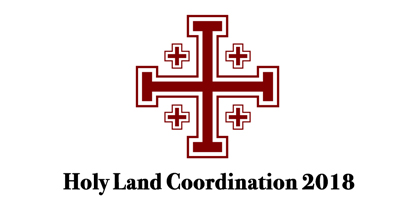This year’s Holy Land Co-ordination (HLC2018), the annual meeting of European, North American and South African Bishops, which, since the 1990s, has been undertaking an annual visit to the various Christian communities present in the Holy Land, is to begin in Jerusalem.
A common thread running throughout the visit is this year’s theme of education, with a series of meetings and visits of an educational nature in order to understand the importance education of young people has in the realisation of a future of peace in the region. The bishops will meet initially with some young people in a Jewish school Mor Jewish High School in Makabim-Reut, before meeting a group of law students at the Jewish University of Jerusalem, who are studying multiculturalism and deal with legal cases regarding people against whom there has been discrimination.
Subsequently, they will also meet the Parents Circle – Families Forum, a body which brings together more than 600 Israeli and Palestinian families who have lost a relation due to the prolonged conflict and who today, through various initiatives, support peace, reconciliation and tolerance.
In Beit Jala, Fr Iyad Twal will give a presentation on the activity of the Latin Patriarchate of Jerusalem in promoting an education which aims at being an instrument of peace and justice, and this will be followed by a series of visits to Christian schools administered directly by the Latin Patriarchate.
In Emmaus-Qubeibeh, the bishops will visit a home for the elderly and will meet some young volunteers working there. Br Peter Bray, Vice-Rector of the University of Bethlehem, will present the Qubeibeh Nursing Programme (QNP): a programme which offers prospects and work opportunities for young people in a largely rural area, with high levels of unemployment and many social and political problems.
This year the HLC2018 has decided to celebrate Sunday Mass on 14 January with the small Christian community in Gaza, followed by a visit to the House of Peace run by the Missionaries of Charity; a brief meeting with young Christians and a comforting visit to the sick in the community.
Accompanying the European bishops and representing the Council of European Episcopal Conferences will be Mgr Duarte da Cunha, CCEE General Secretary.
The meeting is organised by the Bishops’ Conference of England and Wales with the support of CCEE.
The following bishops will take part in the Holy Land Co-ordination:
His Lordship Mgr Declan Lang (Clifton, England and Wales – Co-ordinator)
His Lordship Mgr Lionel Gendron (Saint-Jean Longueuil, Canada)
His Lordship Mgr Udo Bentz (Mainz, Germany)
His Grace Mgr Riccardo Fontana (Arezzo-Cortona-Sansepolcro, Italy)
His Lordship Mgr Donal McKeown (Derry, Ireland)
His Lordship Mgr Pierre Bürcher (Iceland)
His Lordship Mgr José Ornela Carvalho (Setubal, Portugal)
His Lordship Mgr William Kenney (Birmingham, England and Wales)
His Lordship Mgr Nicholas Hudson (Westminster, England and Wales)
The Right Reverend Christopher Chessun (Church of England, United Kingdom)
His Lordship Mgr William Nolan (Galloway, Scotland)
His Grace Mgr Joan-Enric Vives Sicilia (Urgell, Spain)
His Grace Mgr Stephen Brislin (Cape Town, South Africa)
His Lordship Mgr Dr. Felix Gmür (Basel, Switzerland)
His Lordship Mgr Oscar Cantu (La Cruces, USA)
For further information about the meeting and interviews, please contact
Alexander.desforges@cbcew.org.uk/ 0044 (0)7983 704 097
THE HOLY LAND COORDINATION – Additional information
The Holy Land Co-ordination, comprising bishops coming from the whole of Europe, North America and South Africa, was established at the end of the 20th century at the invitation of the Holy See with the aim of visiting and supporting the Holy Land’s local Christian communities.
The Co-ordination’s raison d’être can be expressed through the “3 Ps”: Prayer, Pilgrimage, Pressure.
Prayer is the framework within which the annual meeting takes place, with the daily celebration of the Eucharist, often in different Rites and with the local Catholic communities.
Pilgrimage is one of the most interesting and informative aspects of the annual gathering. The bishops go individually or in groups to visit the Catholic communities, meeting their members and at times local political figures, too. In difficult times, the visiting bishops have often listened to requests for a greater presence of pilgrims, and there has been a concerted and successful effort on the part of the Bishops’ Conferences to encourage pilgrimages.
Pressure, or a softer version perhaps termed “Persuasion”, refers to the work to be undertaken after the annual meeting, when the bishops return home and speak to their own Governments, Members of Parliament, Israeli and Palestinian Ambassadors and to the media about a vast range of questions which concern the lives of Christians. In line with the approach adopted by the Holy See elsewhere, the bishops do not seek privileges for Christians, but dignity and justice for them and for others who live in similar conflict situations. Perhaps there should be a fourth P: Presence. The bishops are present every year, and by their presence they hope, above everything else, to remind the “living stones” of the Christian communities in the Holy Land that they are not forgotten by their brothers and sisters in other parts of the world.
Other information (Photos and videos) will be available here.
The news release is available in English, French, German and Italian.

